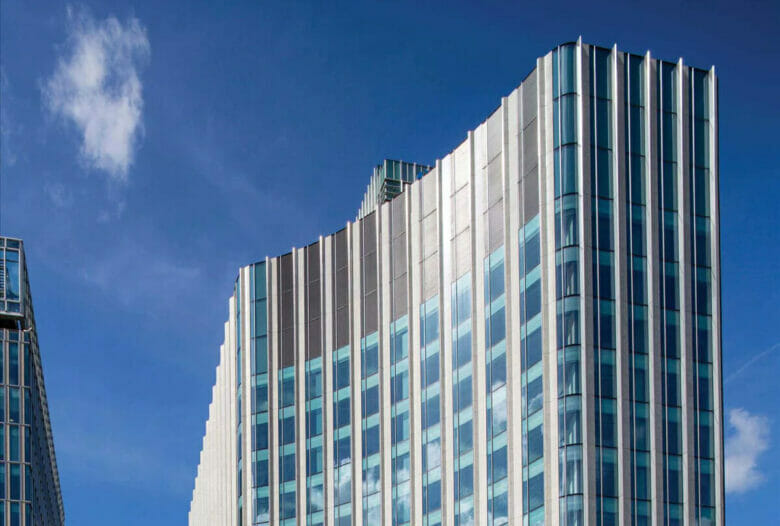
JP Morgan Markets will see its lease at 5 Churchill Place expire in 2029 (Source: Knight Frank)
Mainland property investor Cheung Kei Group is struggling to offload a pair of office buildings on London’s Canary Wharf as media reports emerge that the Shenzhen-based firm has already defaulted on a loan backed by one of the two properties, with debt on the second said to be due next month.
JLL is currently marketing both 20 Canada Square and 5 Churchill Place in the prime commercial district, with an account in Bloomberg earlier this week indicating that Cheung Kei had failed to repay a £265.5 million loan on 20 Canada Square when it came due in October of last year, with debt secured by 5 Churchill Place said to be coming due next month.
With the loan deadline on the garments-to-property conglomerate’s remaining London asset coming up quickly, market players familiar with attempts to sell the properties held out little hope for an orderly disposal, as assets values continue to slide. “There haven’t been any bids on the asset recently, it’s really been slow. The market in Canary Wharf is pretty depressed from an occupational and investment standpoint,” a market source told Mingtiandi.
Cheung Kei, which once hoped to set up an asset management business to help lead a wave of mainland investment into the UK, is now seeing its headquarters in Hong Kong’s Hung Hom area being seized by creditors, according to sources who spoke with Mingtiandi, with chairman Chen Hongtian’s personal residences in the Asian financial hub also being taken over by banks.
Market Goes Quiet
Cheung Kei is said to have put the two properties on the market more than one year ago, with initial asking prices of £385 million for 20 Canada Square and £260 million for 5 Churchill Place, with a source familiar with the tender process indicating that bids received had not been accepted by the family-owned mainland China player.

Chen Hongtian of Cheung Kei
Originally founded in Shenzhen, Cheung Kei is said to have put 5 Churchill Place, which once served as headquarters for Bear Stearns, on the market in early 2022. While the company is said to have received bids of around £200 million for the property during last year, Cheung Kei reportedly deemed that level of compensation insufficient.
“The market has not been able to get to the levels the owner has wanted,” said Nick Braybrook, partner and head of London capital markets at Knight Frank, who is not involved in marketing the properties.
Cheung Kei had purchased 20 Canada Square, a 12-storey prime office block for £410 million (then $530 million) in July 2017 and followed up in December of that year with its £270 million purchase of the 319,000 square foot (29,636 square metre) 5 Churchill Place.
The mainland firm had purchased both properties as pilot acquisitions in what was planned as a European asset management business aimed at leading investments in property assets in the UK and on the continent on behalf of mainland investors, with that business never having been realised.
The acquisition of 5 Churchill Place was financed with the help of a £175 million loan from Lloyd’s Bank as well as mezzanine debt extended by an undisclosed international conglomerate. Lloyd’s is understood to no longer hold the majority of that initial loan.
Built in 2009, 5 Churchill Place has JPMorgan Chase & Co as its anchor tenant occupying about 10 floors of its 12 floors.
For 20 Canada Square, the 556,000 square foot property is reported to have been on the market for at least two years, and is said to have received an offer at a £365 million valuation in 2021, although that deal fell through later that year, according to a market source.
The 12-storey property is being marketed as an asset for renovation and repositioning.
Cheung Kei took out a separate £265.5 million loan from Lloyd’s Bank to finance its purchase of 20 Canada Square five years ago, with Bloomberg indicating that the mainland investor had defaulted on the debt last October. A source familiar with the debt facility said that Lloyd’s no longer held a significant position in that obligation, while JLL is understood to continue to market both properties on behalf of Cheung Kei.
Cheung Kei had not responded to inquiries by the time of publication, while representatives of both JLL and Lloyd’s Bank declined to comment.
European Expansion Falls Short
Cheung Kei’s Canary Wharf office acquisitions were among a wave of Asian acquisitions of London commercial properties in 2017 as the British pound slumped in the wake of the Brexit decision a year earlier.
As Cheung Kei’s founder, Chen started in the garment business in Guangdong province, before venturing into real estate investment where he built a portfolio of properties in southern China. Previously based in Shenzhen, Cheung Kei now lists Hong Kong as its home base.Chen was estimated by China’s Hurun Report to have a household fortune of $5.6 billion as of April 2022.
While Cheung Kei did not respond to queries about the reported loan defaults, a real estate industry veteran who had participated in Cheung Kei’s London deals attributed the company’s struggles in part to an unwillingness to adapt to the UK business environment.
“You can’t take your Shenzhen business mindset to a market like London, antagonise the very professionals that you depend on to make informed investments and expect to succeed in a market thousands of miles from your home base,” an insider told Mingtiandi.
Selling Off-Season
For Ciarán Londra, a partner at law firm Bryan Cave Leighton Paisner (BCLP) in Singapore who advises Asian investors on overseas property investments, said that more properties likely to join Cheung Kei’s assets on the market this year as banks begin to tighten lending standards amid growing market uncertainties.
Since the end of last year, Londra said lenders have started talking to highly leveraged borrowers about bringing down their loan-to-value (LTV) ratios, a metric used to assess credit risks, through equity injections, asset sales or other means.
“I think we will see more assets coming to market as we get through Q2 and into Q3 as banks push to see LTVs brought down and into line with the loan documentation,” he said. “There may well be further distress, but the reality is there is so much money on the sidelines waiting to come into the market (and snap up) genuinely quality assets or opportunities.”
Falling values for UK commercial properties have put pressure on highly leveraged buyers, with office property valuations having slid 21 percent during 2022, according to CBRE, at the same time that fresh credit has become harder to obtain.
Leave a Reply